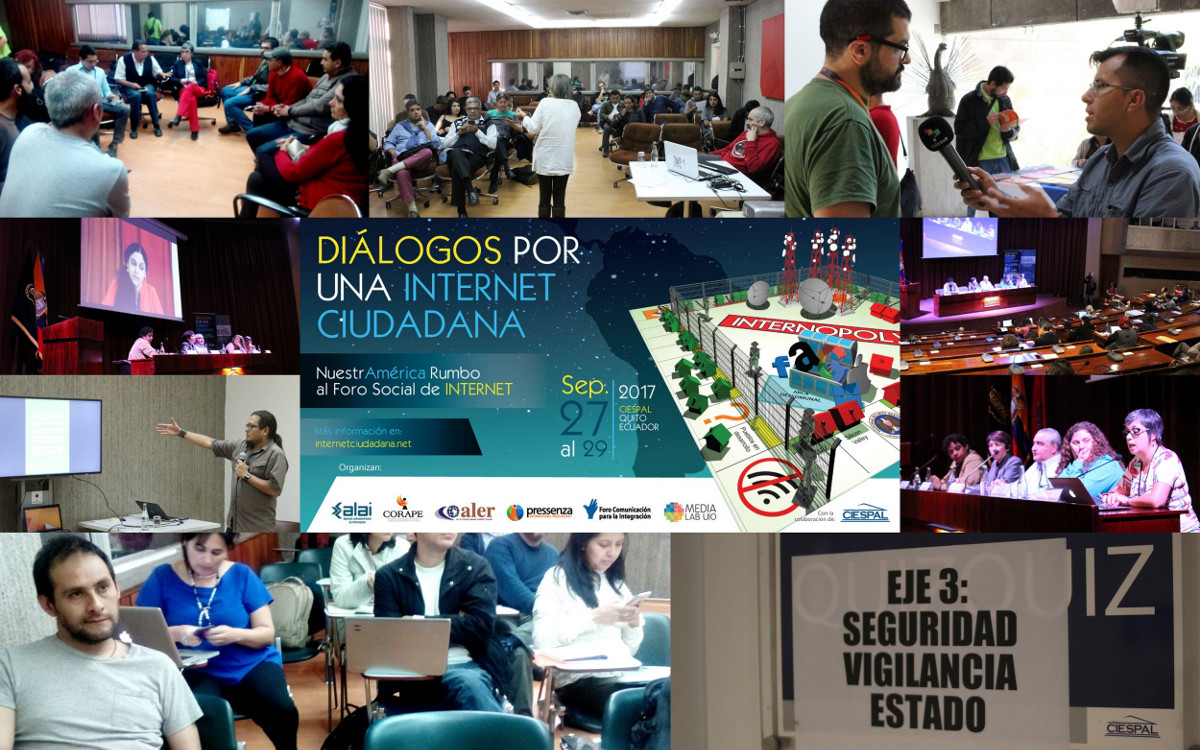Introduction
The struggle against our own weaknesses (…) whatever the difficulties created by the enemy may be, this struggle against ourselves is the hardest, both in the present and in the future of our peoples.
— Amilcar Cabral, Havana, 1966.
From this moment on, each man must stand guard over his own life – General José de San Martín, 1815.
The Dialogues for a Citizen’s Internet meeting brought together some seventy participants from all Latin American and Caribbean countries, as well as guests from India, the United States, and Europe. In preparation for the Internet Social Forum, this unprecedented meeting was based on three main themes and work groups, alternating between panels and plenaries over the three days of dialogue. The proposals and conclusions discussed during the meeting were published on the website al.internetsocialforum.net.
This text seeks to make a cross-analysis of the debates and ideas put across during the meeting. There are various reasons for doing this. Firstly, the issue of the internet and its complex relationship with society constitutes a systemic, transversal field that challenges many usual analytical models. Secondly, the meeting, a short, intense moment combining action, communication and reflection, produced a “whole” that is difficult, perhaps impossible, to summarize or encompass, and so it is useful to look deeper at the back and forth between the particular issues and the views as a whole. Lastly, the context of the forum aims precisely at a kind of thinking that is independent, participatory and inclusive, far removed from cutting-edge, specialized or theoretical positions.
In short, the challenge is to think as a network, with the multiple voices, perspectives and experiences present at the meeting. Obviously, this text should not substitute or replace the elements discussed during the process of the meeting and subsequently, but should instead incorporate them, connect them, and put them into perspective.
On a methodological level, we gathered the notes and proposals discussed in each debate space to then load them into a relational information mapping tool that can be consulted at al.internetsocialforum.net. This is based on the free software Desmodo, similar to other computer-assisted qualitative data analysis (CAQDAS) tools. Naturally, the following text cannot be separated from its author’s subjective and intellectual construction.
A mosaic of issues, five strategic focuses
When a person walks gradually towards a new landscape, their forward movement allows them to see first the general features of the view and then progressively the more detailed traits. In a similar approach, moving from the overall to the specific, we can discern five emerging focuses that make up the spinal column of the ideas in Quito:
- 1. Reinterpreting the internet and measuring its metabolism: The internet has changed the nature of various social structures, bringing about a major rupture. We are living in a new era, very different from the beginnings of the internet around 1993, which means making an effort to survey, measure and renew the framework for interpreting cyberspace.
- 2. Foreseeing a new struggle on the horizon: As well as technological capacities, there is today a narrative and ideological asymmetry in favour of the major internet players, which leads to the need for a new horizon of struggle for advocates of an open, citizen’s internet.
- 3. Ally and coordinate: As this is an expansive, horizontal space of connectivity, while sectoral, thematic or specialized approaches are necessary, they are not the most suitable for an attempt at citizen appropriation; it is vital to form multi-sector alliances and bridges between identities and other thematic struggles.
- 4. Being a collective actor: The construction of a citizen’s internet implies the construction of a collective actor capable of carrying out a transforming agenda. Being a collective actor does not mean creating a formal, bounded institution, but rather a process, a shared agenda, a framework capable of combining unity of perspectives and diversity of initiatives.
- 5. Deepening new paradigms: Internet is and will continue to be an element that shakes up citizenship, the socio-political matrix and the economic matrix; but to be placed at the service of a new emancipating or “post-capitalist” horizon, it is necessary to rethink previous conceptual frameworks and go deeper into new paradigms, particularly in the field of the regulatory architecture of the web, the concept of politics, digital goods and wealth.
These five outstanding lines in the general overview of the meeting are inseparable from each other and form the outline of one single perspective.
It should be stressed that in almost all the spaces and especially in the first days, participants spent time on the exercise of characterizing reality and transformations related to the evolution of the Internet. For participants, it was necessary to first stand before a context, share criticisms and diagnosis with others, before evaluating their degree of consensus and formulating proposals. Not all the elements of diagnosis could be included in this present work. However, all the proposals are incorporated from the guidelines that each group produced in their work focus according to the methodology defined by the organizers.







